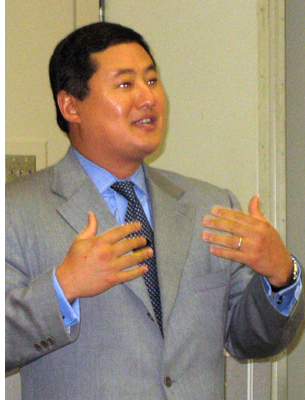Author of Torture Memo Still Teaching at Berkeley
While on a leave of absence from Berkeley, law professor John Yoo took a position with the Bush Administration. During his time there, he wrote controversial memoranda that officials used as the legal basis for interrogation techniques now widely viewed as torture. Many claim that Yoo’s memoranda was the green light that allowed US interrogators to inflict extreme emotional and physical pain on detainees, ultimately leading to the death of at least one innocent man.
Today, Yoo has returned to Berkeley and continues to teach law to young scholars. Do you think this is acceptable?
The Torture Memos
Yoo’s memoranda states:
“The victim must experience intense pain or suffering of the kind that is equivalent to the pain that would be associated with serious physical injury so severe that death, organ failure, or permanent damage resulting the loss of significantly bodily function will likely result.”
Yoo goes on to argue that the Eighth Amendment, which prohibits “cruel and unusual” punishment, does not apply since the detainees “have not been punished as part of a criminal proceeding.”
In the documentary Taxi to the Dark Side, the film claims that Yoo’s memo encouraged the brutal treatment that ultimately led to the death of detainee, Dilawar, an innocent Afghani taxi driver who was turned in by fellow Afghanis for the tempting ransom offered by US authorities.
A Professor’s Rights
The Honorable William H. Orrick, The Dean of Berkeley Law, addressed this topic in a very personal and passionate letter. He points out that Yoo is entitled to the right of security of employment and academic freedom, but also First Amendment and Due Process Rights. These rights, Orrick states, are essential to the excellence of American universities and the progress of ideas.
Academic Freedom vs. Moral Rights
But what about the rights of Dilawar and the other detainees? Isn’t it essential to protect their rights as well? And, at what point does moral right trump academic freedom?
Personally, I have to take the stance that academic freedom should always trump what is deemed to be morally right. In his letter, Dean Orrick claims that the complication of the matter makes it more difficult to take a stance. “Had the professor been on leave marching with Nazis in Skokie or advising communists during the McCarthy era, reasonable people would probably find that an easier case,” states Orrick. “Here, additional things are obviously in play.”
I find this statement to be completely irrelevant. While I wouldn’t be thrilled to find that my professor was marching with Nazis or advising communists, I would not want him to be fired over it. Morality is defined by society and society is often on the wrong side of the moral coin. Throughout history, widely held morals have justified racial segregation, the degradation of women, religious persecution and unthinkable violence. It is the freedom of thought, and uncensored and equally represented discussion that ultimately overcomes injustice. When universities begin censoring their professors and passing moral judgment, we as a society will suffer. In my opinion, allowing Yoo to teach only promotes the critical thinking and intense discussion that these difficult moral issues deserve.
However, this is my opinion and I realize that there are many who may feel differently. Looking at the popularity of the controversy surrounding Yoo on Digg alone tells me that there are very strong feelings about him on all sides. What I find most interesting is that compared to the initial controversy of the memoranda, there is relatively little discussion of the fact that Yoo is now in a position of power of law students. How would you feel if he was your professor? Or you child’s professor?
Please continue the discussion here or on your own blog.







